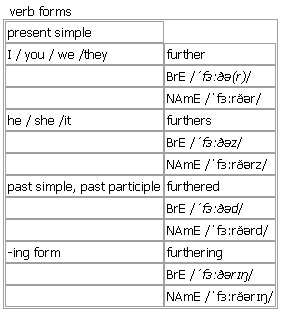|
Từ điển Oxford Advanced Learner 8th
 further
further

fur·ther [further furthers furthered furthering] adverb, adjective, verb BrE [ˈfɜːðə(r)] NAmE [ˈfɜːrðər]
adverb
1. (comparative of far) (especially BrE)at or to a greater distance
Syn: ↑farther
• We had walked further than I had realized.
• Two miles further on we came to a small town.
•The hospital is further down the road.
•Can you stand a bit further away?
2. a longer way in the past or the future
• Think further back into your childhood.
• How will the company be doing ten years further on?
3. to a greater degree or extent
• The police decided to investigate further.
• My life is further complicated by having to work such long hours.
•Nothing could be further from the truth.
4. (formal)in addition to what has just been said
Syn: ↑furthermore
•Further, it is important to consider the cost of repairs.
more at far/farther/further afield at ↑afield
Word Origin:
Old English furthor (adverb), furthra (adjective), fyrthrian (verb), of Germanic origin; related to ↑forth.
Which Word?:
farther / further / farthest / furthest
These are the comparative and superlative forms of far.
To talk about distance, use either farther, farthest or further, furthest. In BrE, further, furthest are the most common forms and in NAmE, further and farthest: ▪ I have to travel further/farther to work now.
To talk about the degree or extent of something, further/furthest are usually preferred: ▪ Let’s consider this point further.
Further, but not farther, can also mean ‘more’ or ‘additional’: ▪ Are there any further questions? This sounds very formal in NAmE.
Idioms: ↑go further ▪ ↑go no further ▪ ↑not go any further ▪ ↑take something further
adjective (comparative of far)
more; additional
• Cook for a further 2 minutes.
• Have you any further questions?
•For further details call this number.
•We have decided to take no further action.
•The museum is closed until further notice (= until we say that it is open again).
Word Origin:
Old English furthor (adverb), furthra (adjective), fyrthrian (verb), of Germanic origin; related to ↑forth.
Language Bank:
addition
Adding another item
▪ Bilingual children do better in IQ tests than children who speak only one language. In addition ▪ / What is more ▪, they seem to find it easier to learn third or even fourth languages.
▪ Learning another language not only ▪ improves children's job prospects in later life, but also ▪ boosts their self-esteem.
▪ Teaching children a second language improves their job prospects in later life. Other ▪ benefits include ▪ increased self-esteem and greater tolerance of other cultures.
Another ▪ / One further ▪ / One additional ▪ reason for encouraging bilingual education is that it boosts children's self-esteem.
▪ Studies suggest that bilingual children find it easier to learn additional languages. There is, moreover ▪, increasing evidence that bilingual children perform better across a range of school subjects, not just foreign languages.
▪ His claim that children find bilingual education confusing is based on very little evidence. Moreover ▪, the evidence he does provide is seriously flawed.
▪ Research has shown that first-language development is not impeded by exposure to a second language. Furthermore ▪, there is no evidence to support the claim that children find bilingual education confusing.
verb ~ sth
to help sth to develop or be successful
• They hoped the new venture would further the cause of cultural cooperation in Europe.
• She took the new job to further her career.
Verb forms: 
Word Origin:
Old English furthor (adverb), furthra (adjective), fyrthrian (verb), of Germanic origin; related to ↑forth.
Example Bank:
•We are committed to furthering the interests of our members.
|
|
|
▼ Từ liên quan / Related words
Related search result for "further"
|
|
